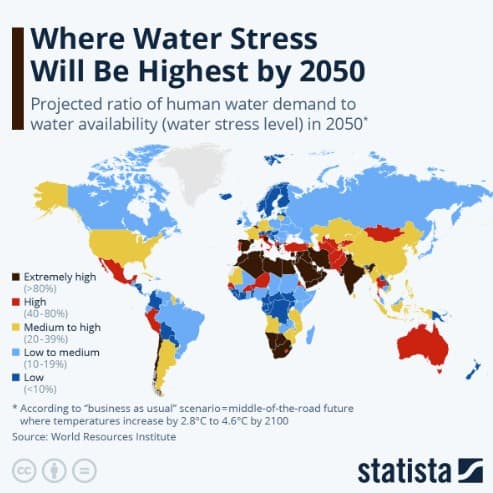May 17, 2025 | 01:48 GMT +7
May 17, 2025 | 01:48 GMT +7
Hotline: 0913.378.918
May 17, 2025 | 01:48 GMT +7
Hotline: 0913.378.918

Water is not only the basis of life for animals and plants, but is also likely to become a contested resource in parts of the world in the coming decades. According to UN figures, global water stress, i.e. the proportion of water withdrawn for use in industry, agriculture or private households in relation to available water, was manageable at 18.2% in 2020. In 2022, however, 2.4 billion people were living in areas that are exposed to extreme water stress in some cases.
It is not possible to determine exactly how high this will be by 2050 due to numerous factors such as the global population or economic and political developments in emerging and transition countries. This is why scientists are currently working with scenarios instead of more precise estimates. However, it is certain that the demand for water will increase steadily and that many countries are already consuming more than they have available.
As Statista's Martin Armstrong shows in the infographic below, based on projections by the World Resources Institute (WRI) , 51 of the 164 countries and territories analyzed are expected to suffer from high to extremely high water stress by 2050, which corresponds to 31 percent of the population.
According to WRI, the scenario used corresponds to a "business as usual" future with temperature increases of between 2.8 and 4.6 degrees Celsius by 2100 and a world that remains unequal. In addition to the entire Arabian Peninsula, Iran and India, most North African countries such as Algeria, Egypt and Libya are among the countries that are expected to consume at least 80 percent of the available water by 2050.
However, the phenomenon of water scarcity is not limited to emerging countries. Southern European countries such as Portugal, Spain and Italy are also reportedly already under high water stress, and the situation in Spain is set to worsen significantly by 2050. For France and Poland, the WRI experts assume medium to high water stress, which corresponds to a consumption rate of 20 to 40 percent of available resources.
(OP)

(VAN) Fourth most important food crop in peril as Latin America and Caribbean suffer from slow-onset climate disaster.

(VAN) Shifting market dynamics and the noise around new legislation has propelled Trouw Nutrition’s research around early life nutrition in poultry. Today, it continues to be a key area of research.

(VAN) India is concerned about its food security and the livelihoods of its farmers if more US food imports are allowed.

(VAN) FAO's Director-General emphasises the need to work together to transform agrifood systems.

(VAN) Europe is facing its worst outbreak of foot-and-mouth since the start of the century.

(VAN) The central authorities, in early April, released a 10-year plan for rural vitalization.

(VAN) Viterra marked a significant milestone in its carbon measurement program in Argentina, called Ígaris, reaching 1 million soybean hectares measured.